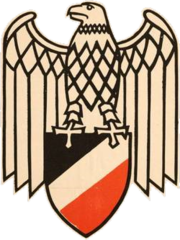German Empire Party Deutsche Reichspartei | |
|---|---|
 | |
| Abbreviation | DRP |
| Leader |
|
| Founded | 21/22 January 1950[1] |
| Dissolved | 1965 |
| Merger of | |
| Merged into | National Democratic Party of Germany[5][6] |
| Newspaper | Reichsruf |
| Ideology | Before 1952: * German nationalism * Pan-Germanism * Antisemitism * Anti-communism After 1952: * Neo-Nazism |
| Political position | Far-right |
| European affiliation | National Party of Europe |
| Colors | Brown |
The Deutsche Reichspartei (DRP), also known as the German Empire Party or German Imperial Party, was a nationalist, far-right, and later neo-Nazi political party in West Germany. It was founded in 1950 from the German Right Party (German: Deutsche Rechtspartei), which had been set up in Lower Saxony in 1946 and had five members in the first Bundestag, and from which it took the name. Its biggest success and only major breakthrough came in the 1959 Rhineland-Palatinate regional election, when it sent a deputy to the assembly.[5]
Prior to its 1952 turn towards explicit neo-Nazism, the DRP advocated German nationalism, pan-Germanism and support of a new Reich, and pan-European nationalism. An anti-communist, antisemitic, and anti-socialist party, its criticism of capitalism was reflected in economic antisemitic terms rather than socialism, in addition to racial antisemitism. When the openly neo-Nazi-oriented Socialist Reich Party (SRP) was declared unconstitutional and disbanded by the Federal Constitutional Court of Germany, many of its members joined the DRP.[7] With its lack of success, the party was symbolically liquidated and followed by the establishment of the National Democratic Party of Germany (NPD).[5]
- ^ "Deutsche Reichspartei (DRP)". Tabula Rasa. 6 July 2015. Retrieved 16 July 2023.
- ^ Cas Mudde (2000). The Ideology of the Extreme Right. Manchester University Press. pp. 25–26.
- ^ Karl Dietrich Bracher (1971). The German Dictatorship, Penguin. p. 581.
- ^ "Mitteilungen" [Report] (in German). Bavarian Office for the Protection of the Constitution. Archived from the original on 2008-05-16. Retrieved 2009-09-16.
- ^ a b c Luciano Cheles, Ronnie Ferguson & Michalina Vaughan (1991). Neo-Fascism in Europe. Longman. p. 71.
- ^ Horst W. Schmollinger, Richard Stöss (1975). Die Parteien und die Presse der Parteien und Gewerkschaften in der Bundesrepublik Deutschland 1945–1974. Westdeutscher Verlag. p. 187.
- ^ Martin A. Lee, The Beast Reawakens, Warner Books, 1998, p. 115